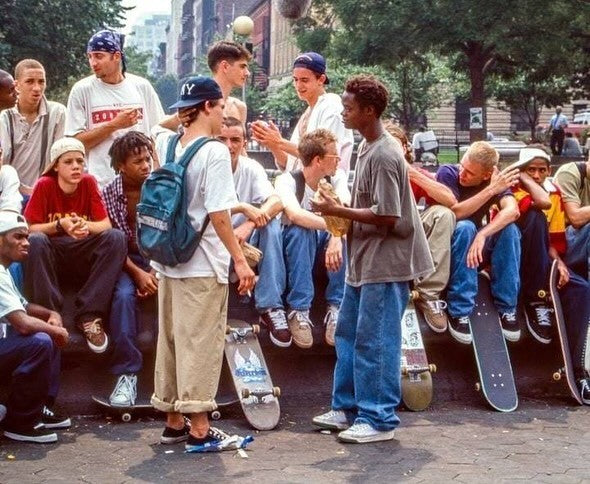Why the 90s Continually Resurface in Generational Identity Discussions
The 90s never truly went away. In music, cinema, TV series, and of course, fashion, they're re-emerging everywhere, acting as a common language that unites us. But why is this comeback so powerful when it comes to generational identity? And how does this retro revival resonate with today's ethical fashion and vegan sneakers? In this article, we explore the link between belonging, style, and collective consciousness – and show you how iné fits into this narrative.
90s Generational Identity: Between Heritage and Belonging
A Decade of Cultural Milestones
The 90s shaped an entire generation. It was the era of audio cassettes, baggy jeans, the rise of hip-hop, and grunge. MTV dictated the soundtrack, and early video games were already connecting communities. Within this landscape, clothing, and especially sneakers, became symbols of recognition. Wearing certain brands, certain models, meant belonging to a group, asserting a style and an identity.

Belonging and Dress Codes
On the streets and in schoolyards, 90s fashion acted as a social code. Sneakers were more than just shoes: they expressed status, musical taste, and cultural affinity. "Crews" recognized each other by their kicks. A sneaker was never neutral; it said something about you, about your world.
Why This Revival Today?
Seeking Stability Amidst Uncertainty
In a world marked by climate crisis, economic instability, and digital overload, revisiting the 90s offers a moment of respite. This decade embodies a "simpler" era, where authenticity and local communities seemed to take precedence. Retro dress codes become reassuring, familiar benchmarks, carrying collective memory.
Millennials and Gen Z: A Quest for Meaning
Younger generations, particularly millennials and Gen Z, claim a strong connection between consumption and identity. They seek to define themselves not just by what they wear, but by what those clothes say about their values: durability, respect for the planet, inclusion. The 90s, revisited through a responsible approach, become fertile ground for expressing these commitments.

Credits: https://good-moon.com/
Ethical Fashion and the 90s: A New Language
From Fast Fashion to Sustainable Style
The 90s were synonymous with overconsumption, but today, their aesthetic is being reinterpreted in light of ecological challenges. Oversize fits, pop colors, sportswear minimalism… these codes are returning in collections designed with recycled, bio-sourced, or vegan materials. Retro is becoming responsible.
Where Style Meets Sustainability
For a long time, ethical fashion suffered from a dull image: basic, unstylish products. At iné, we refuse this compromise. As the founder says:
"I want to shake up the codes of sustainable fashion, far from the outdated image we still have of recycled products. I want to create ethical, vegan, unisex, and above all, attractive fashion. So that people say, 'It's beautiful, and it's eco-responsible too!'"

"Vibes": a sneaker collection inspired by the 90s, manufactured in Europe with recycled materials. Credit: iné
iné: Vegan & Retro Sneakers as a Symbol of Unity
Retro-designed sneakers, built to last
iné sneakers reinterpret the best of the 90s with a contemporary approach: vegan materials like corn-based leather or bio-PU, local manufacturing in Portugal, enhanced durability. Everything is designed to combine retro aesthetics with ethical consciousness.
A Collective Identity Rooted in Style
iné is much more than just a sneaker. It's a symbol of shared values: openness, durability, creativity. By offering mixed and unisex models, the brand erases gender boundaries to return to the essential: sneakers for everyone, carrying meaning.

"Vibes" green and neon yellow: sneakers inspired by the 90s, manufactured in Europe with recycled materials. Credit: iné
FAQ – Generational Identity & Ethical Fashion
Q1: What is generational identity?
It's the set of tastes, codes, and values that define a generation and create a sense of belonging.
Q2: Why are the 90s making such a strong comeback?
They embody authenticity, creativity, and strong communities, values sought after by younger generations.
Q3: What is a vegan sneaker?
A sneaker designed without leather or animal materials, using alternatives like corn-based, grape-based, or bio-PU.
Q4: Are vegan sneakers durable?
Yes, if they combine responsible materials with quality manufacturing. This is the case at iné, with production in Portugal.
Q5: Why is iné different?
Because the brand refuses to choose between style and commitment. Its sneakers are retro, desirable, and ethical all at once.

"Vibes": a sneaker collection inspired by the 90s, manufactured in Europe with recycled materials. Credit: iné
Conclusion
The 90s revival is not just a nostalgic trend: it's the expression of a need for belonging and shared benchmarks. iné is part of this story by offering sneakers that reinvent 90s generational identity: vegan, unisex shoes with a retro design, proving that ethics and aesthetics can go hand in hand. Because today, more than ever, we want to say: "It's beautiful, and it's eco-responsible too!"
Contact: contact@ine.fr


Leave a comment